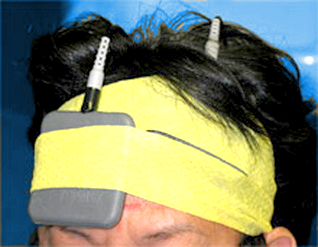Students charge ahead on brain-stimulation
 Some obvious concerns have been raised about DIY electrical brain stimulation kits, which are growing in popularity due to claims that they enhance mental performance.
Some obvious concerns have been raised about DIY electrical brain stimulation kits, which are growing in popularity due to claims that they enhance mental performance.
Always looking for an edge, students around the country have been buying and using brain stimulation kits, but they could provide entirely the wrong kind of stimulation.
Highly-controlled studies have suggested that electrical stimulation of the brain can have a beneficial effect on mental arithmetic, and even aid learning for people with attention deficit hyperactivity disorder (ADHD).
They have even had positive results from research on treating depression or helping patients who have suffered brain injury or stroke.
But this is only in circumstances where all variables – including intensity of the zapping and its duration - are tightly controlled.
Professor Colleen Loo from the Black Dog Institute says there can be some benefit to transcranial direct current stimulation (tDCS), but it may not be appropriate to try at home.
“Used in the right way it can make very useful changes to your brain functioning, but if you get it wrong - if you, for example, reverse the position of the two electrodes - you could actually have the opposite effect,” Professor Loo told the ABC.
“I certainly wouldn't recommend doing it to yourself at home.”
“There is some evidence to suggest maths ability and learning may be improved, but in order to do this we must stimulate certain parts of the brain in a certain way,” fellow researcher Dr Donel Martin told reporters.
“Devices like this where you just plonk it on your head, it's really unclear what areas of the brain are being targeted.
“There's been very little research conducted in using these devices on children.
“Without medical supervision there could be unwanted and unexpected side effects.
“There's definitely a risk with people pushing the boundaries of what's shown to be safe... If you push beyond those limits, we don't know what the consequences are,” he said.







 Print
Print